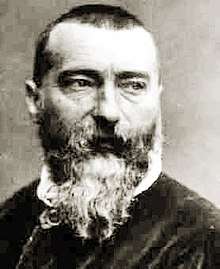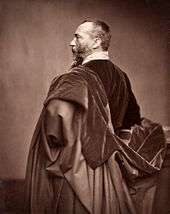Jean-Baptiste Alphonse Karr
Jean-Baptiste Alphonse Karr (24 November 1808 – 29 September 1890) was a French critic, journalist, and novelist.

Life
Karr was born in Paris, and after being educated at the Collège Bourbon, became a teacher there. Some of his novels, including his first, Sous les Tilleuls (1832), were autobiographical romances. A second novel, Une heure trop tard, followed next year, and was succeeded by many other popular works. His Vendredi soir (1835) and Le Chemin le plus court (1836) continued the vein of autobiographical romance with which he had made his first success. Geneviève (1838) is one of his best stories, and his Voyage autour de mon jardin (1845) was deservedly popular. Others were Feu Bressier (1848), and Fort en thème (1853), which had some influence in stimulating educational reform.
In 1839, Karr became editor of Le Figaro, to which he had been a constant contributor; and he also started a monthly journal, Les Guêpes, of a keenly satirical tone, a publication which brought him the reputation of a somewhat bitter wit. His epigrams are frequently quoted, for example "plus ça change, plus c'est la même chose",[1] or "the more things change, the more they continue to be the same thing,[2] usually translated as "the more things change, the more they stay the same" (Les Guêpes, July 1848).[3] On the proposal to abolish capital punishment, "je veux bien que messieurs les assassins commencent",[4] i.e. "let the gentlemen who do the murders take the first step".
In 1848, he founded Le Journal. In 1855 he went to live in Nice, where he indulged his predilections for floriculture, and gave his name to more than one new variety, notably the dahlia (New International Encyclopedia). Indeed, he practically founded the trade in cut flowers on the French Riviera. He was also devoted to fishing, and in Les Soirées de Sainte-Adresse (1853) and Au bord de la mer (1860) he made use of his experiences. His reminiscences, Livre de bord, were published in 1879–1880. He died at Saint-Raphaël (Var).
Family
Karr's brother Eugène was a talented engineer, and his niece Carme Karr was a writer, journalist and suffragist in La Roche-Mabile.
Karr was married to Louise Estelle Clémentine (née Renard de Mentule, born 9 December 1815).[5] They first met in late 1833, and married on 10 February 1834. Their first and only child was born on 2 September 1834.[6] By 1845, the couple had been separated for eight and a half years.[7][8]
Novels

- Sous les Tilleuls (1832)
- Une heure trop tard (1833)
- Vendredi soir (1835)
- Le chemin le plus court (1836)
- Geneviève (1838)
- Voyage autour de mon jardin (1845)
- Feu Bressier (1848)
- Fort en thème (1853)
- Les Soirées de Sainte-Adresse (1853)
- Histoires Normandes (1855)
- Au bord de la mer (1860)
- Une poignee de verites (1866)
- Livre de bord (1879–80)
Legacy
The short story Les Willis was the basis of Giacomo Puccini's opera Le Villi (1884).
The bamboo species Bambusa multiplex Alphonse Karr was named in his honour.[9]
References
- "KARR Alphonse - Tombes Sépultures dans les cimetières et autres lieux".
- Karr, Alphonse; Wood, Rev. J. (1855). A Tour Round My Garden. G. Routledge. p. 313.
alphonse karr.
- "Les Guêpes". Paris Michel Lévy Frères.
- "KARR Alphonse - Tombes Sépultures dans les cimetières et autres lieux".
- Gazette des beaux-arts, vol. 135, ed. J. Claye, p. 49
- Stèle pour Alphonse Karr, Louis Virlogeux, Éditions de Cahiers Bourbonnais, 1975
- Arts, collected vol. 11, Minneapolis Society of Fine Arts, 1988
- Gazette des beaux-arts, vol. 135, ed. J. Claye, p. 49
- "Bambusa multiplex Alphonse Karr".

External links
| Wikiquote has quotations related to: Alphonse Karr |
| Wikimedia Commons has media related to Alphonse Karr. |

- Works by Alphonse Karr at Project Gutenberg
- Works by or about Jean-Baptiste Alphonse Karr at Internet Archive